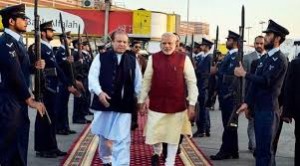 Lahore bus visit was replied by Kargil. Agra Summit was replied by the Parliament attack. PM Manmohan Singh peace initiatives were replied by Mumbai attacks and PM Narendra Modi’s impromptu visit to Pakistan on Christmas is replied by Pathankot attacks. India’s every peace initiative is replied by terror attacks from Pakistan.This has posed challenge for India to how to engage with Pakistan. Disruption of talks and diplomatic relations have proved to be counter-productive. Extremist elements hijack the peace negotiations bringing improvement in relations to a grinding halt. On the other hand maintaining normal relations, inspite of terror attacks, with Pakistan leads to very strong backlash from the domestic quarters.
Lahore bus visit was replied by Kargil. Agra Summit was replied by the Parliament attack. PM Manmohan Singh peace initiatives were replied by Mumbai attacks and PM Narendra Modi’s impromptu visit to Pakistan on Christmas is replied by Pathankot attacks. India’s every peace initiative is replied by terror attacks from Pakistan.This has posed challenge for India to how to engage with Pakistan. Disruption of talks and diplomatic relations have proved to be counter-productive. Extremist elements hijack the peace negotiations bringing improvement in relations to a grinding halt. On the other hand maintaining normal relations, inspite of terror attacks, with Pakistan leads to very strong backlash from the domestic quarters.
Pakistan has multiple centres of power. The democratic elected civilian government in Pakistan do not enjoy absolute freedom. It’existence is dependent on military’s support. Pakistani military has removed civilian government when it didn’t toed the military line. Civilian government would has to take military into confidence before taking strategic decisions. Present PM of Pakistan Nawaz Sharif came to power with the promise of improving relations with India. Anti-India propaganda by political parties in Pakistan has also subsided with the growing realization that the real enemy of Pakistan is not India and better relations with India would be beneficial to Pakistan. In recent elections in PoK emphasis was on development rather than anti-India propaganda. Majority of people in Pakistan want better relations with India. Other power center in Pakistan is army. Army controls major resources of the country and to maintain its supremacy it needs to preserve its relevancy. Improved Indo-Pak relations would lead to existential crisis for Pakistani Army. Therefore Pakistani Army has supported terrorist organisations against India and has not been supporter of better relations with India creating hurdles for Pakistani civilian government. Extremist organisations in Pakistan are the third power center. They are spreading anti-India radical propaganda to instigate people against India. Terrorist organisations would lose relevancy if Indo-Pak relations are normalized leading to erosion of public support. Hence, every peace initiative of India is replied by terror attacks to derail the process and nullify all the peace talks progress. Terrorists have been successful in their objectives. Each terror attack has led to
Terrorists have been successful in their objectives. Each terror attack has led to deterioration of relations leading to grinding halts in peace talks and loss of all previous progress. By stopping talks, making aggressive statements against Pakistan may assuage the domestic public but serves no real purpose. Lack of communication leads nowhere. The impasse still remains and hostility increases. The only way to resolve this situation is talks and strengthen the Pakistani civilian government and take Pakistani army into confidence. The best reply to terrorists would be to deny them their objectives of terror attacks i.e. India and Pakistan should continue to talk. There is need to focus on low hanging fruits in
There is need to focus on low hanging fruits in India-Pakistan relations. By reaching consensus on smaller issues resolution on bigger issues could be achieved because of trust building on smaller issues. Need of the situation is to pluck the low hanging fruits first. Consensus could be reached on Sir Creek issue, TAPI and IPI gas pipe lines, trade relations, movement of people etc. Increased interdependencies would generate good will, people’s support and increased demand for peace and harmony leading to erosion of support to factions which do not want improved relations between India and Pakistan. The present need is to deindex peace talks from terror strikes and stay on course of peace initiatives to achieve incremental cumulative progress and deny terrorists what they want.